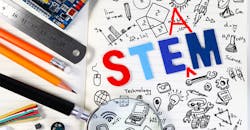A+: The Case For Adding Art in Technical Curriculums
The following is a guest column submitted by a NED reader. To submit your own, email [email protected] or [email protected].
Ignoring the extremist perspective that STEM is actually all M, each of these disciplines share a common attribute: linearity. That linearity is what makes them so powerful. They follow a formulaic, procedural path that ends with a definitive result that's either right or wrong. The result can be reached by anyone familiar with the rules. That same linearity is also their greatest weakness.
We don't live in linear world. Sure, the universe can be modeled with linear techniques, but the universe where we actually live, eat, sleep and buy is defined by our senses. Highly subjective inputs with infinite interpretations that we manipulate with art.
Not art like paintings by Dutch Old Masters (although they have a place in the discussion as well), but art in general. Art as nonlinear thinking that binds linear concepts to obtain a result that can never be reached procedurally. That's why two people with the same camera, with the same settings, simultaneously taking a picture of the same thing will end up with two radically different photos.
Art teaches critical analysis and problem solving. Unfettered and untrammeled perspectives that are never right or wrong, just different. Art is the underlying driver of innovation. Without art the immutable rules governing linear subjects all lead to the same place. This fact is easily illustrated in the electronics department at your local big box store.
Within a product category the design, functionality, overall quality and aesthetics converge as price points drop. All the technical aspects, the STEM subjects, have been utilized and the rules followed with great precision. Nevertheless, all the products are essentially identical — and they suck.
But up there on the top shelf things are different. The very same STEM knowledge was applied, yet it's impossible to not realize what you're looking at is an altogether different thing. Art played a central role in every aspect of creating that product. It was created with STEAM: Science, Technology, Electronics, Art and Math. STEAM that people will happily pay for.
STEAM isn't restricted to tangible goods. Art is the supreme medium of communication. Whether you're an employee trying to push your message upstream and get the attention of decision makers or you're an executive at a startup on the hunt for outside investment, your success rides on how well your audience understands you. Show your potential investor a spreadsheet and if they don't jump out the nearest window you're probably talking to a hologram. Show them a well-designed chart that conveys the same information and you might be on your way to funding. Data writes the music, but it's art that delivers the song.
All the above is to underline the fact a STEM curriculum is intended to give students the ability to compete in an increasingly technical world. But that's not going to happen with the current approach. Because the STEM subjects are linear and follow fixed rules we're simply creating ambulatory calculators who might survive in the workplace. That's a pretty low bar.
We can use art to create STEAM that will fuel the next generation of workers, thinkers and creators. But there are challenges that must be met. One of those challenges, possibly the biggest, is the way we teach STEM subjects. I don't mean changing the metrics to work statistical voodoo on student proficiency reports. I mean real change that benefits the students for their entire lives.
Ask a child why she doesn't like math. The answer is almost certain to be "I'm never going to use that crap". That's not an unreasonable response, considering the child's brief existence up to this point. It's impossible to out logic a child for that same reason.
Perpetually missing from the public education system is evident applicability in lessons in technical subjects. It's not an unrecognized problem, but the solutions are always absurd and fail to acknowledge the uncluttered logic of children.
Most readers will remember the WWII era solutions to the problem. Asking kids to calculate what time two people traveling in opposite directions at known speeds will pass each other. Those word problems stretched applicability even for adults and were absolutely meaningless to a child. Then the solutions were centered around games. Kids like games. Yeah, but only if they're fun. Mathopoly? No.
Now we have substituted modular STEM concept building systems. That's fancy talk for a shit toy that comes disassembled and is only not a brick if you buy an extension module and install the app on your phone. That's not educational. That's consumerism boot camp bogged down in the quagmire of ethical and moral issues surrounding children having smartphones.
I don't have all the answers, but I do know that now is the time for the the STEAM conversation to move out of breakout rooms and sidebars and occupy center stage. Action now can still save a bunch of kids from an imaginary, linear existence.
Jesse Z. Melton is a process consultant focusing on machine and workholding design and development with over 20 years of engineered design experience. He is an advocate of strong in-house R&D, opponent of misplaced labor and constructor of criticisms aimed at an educational system that teaches how to buy not do. He can be reached at [email protected].
About the Author
Jesse Z. Melton
Process Consultant
Jesse Z. Melton is a process consultant focusing on machine and workholding design and development with over 20 years of engineered design experience. He is an advocate of aggressive investment in scientific research by governments and NGOs.

